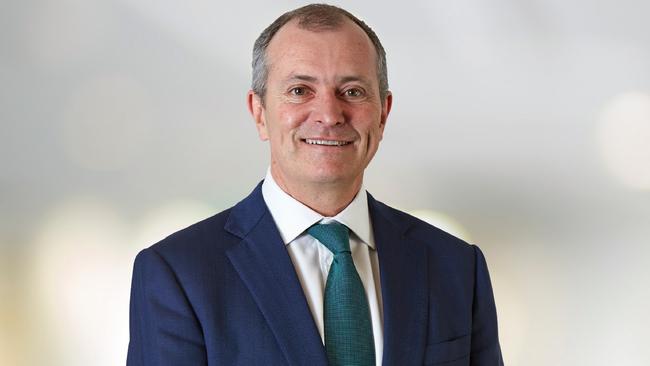
Every year The Australian’s John Durie asks some of the biggest names in Australian business five key questions about what’s coming in the year ahead.
Here, in his own words, is what Iluka CEO Tom O’Leary sees ahead in 2020.
Read more from the 2019 CEO Survey.
How is your company affected by low-interest rates and what is needed to boost the economy?
Iluka is less affected by low-interest rates directly; it is more affected by the factors that bring about a low-interest rate environment. Our markets are global and demand for the company’s products is driven by global economic activity and growth, as opposed to the specific performance of the Australian economy. Iluka’s products have predominant end-use applications in consumer goods (ceramics, paint, plastics, construction, sporting goods etc) and so we would obviously prefer higher levels of growth.
The bulk of our mineral products are traded in US dollars and so a weaker Australian dollar has a positive impact on Iluka’s revenues. Comparatively lower domestic interest rates tend to lower the value of the Australian dollar but we’re obviously seeing lower rates across the world.
The biggest drags on the Australian economy, and many others, are largely geopolitical – for the moment some in the world seem to be prepared to ignore the economic and security benefits of rules-based trade and cooperation. One of the many drawbacks of this situation is a lingering sense of uncertainty among governments, businesses and communities generally. With monetary policy stretched almost to its limit in Australia, there are few levers to pull at a domestic level to restore the required economic confidence to stimulate growth.
While there are always things governments can and should do around reducing red tape and the like to assist business, I regard the geopolitical challenges as the key hurdles to overcome.
What is the impact of government regulations on your company including those applying to the financial sector?
Iluka’s Australian operations encompass Western Australia, South Australia, Victoria and New South Wales. Though it’s been elusive, the holy grail for domestic regulation in the resources sector is better harmonisation between state jurisdictions and also in their interaction with the Commonwealth. Beyond the efficiencies involved, I think this would also enhance the ability of regulatory agencies to remain responsive and current. Efforts are being made; and we certainly welcome the Commonwealth’s review of the Environment Protection and Biodiversity Conservation Act, to cite one example.
What percentage of company revenues are spent on research and development and how is your company using technology to improve performance?
Iluka’s pipeline of growth projects is emblematic of the emerging reality of the mineral sands industry – that the conventional, economic, ‘easy’ resources have been or are in the process of being depleted; and new supply will require investment either in higher-risk jurisdictions or in innovation to overcome what has been regarded historically as sizeable technical hurdles in mining or processing. At Balranald in NSW, we are trialling a mining technology that is potentially transformative in that it may provide the means to mine a number of the smaller deposits across our portfolio commercially. Other benefits are expected to include the prospect of lower capital-intensive development, phased production expansion and lower environmental impacts. Similarly, on the processing side, we are currently studying the feasibility of technology not previously employed in the mineral sands industry at our Wimmera project in Victoria. If executed, this project offers a potential long-term solution to global zircon supply; a diversification opportunity (rare earths); and the possibility of creating a new Australian mineral processing industry. Iluka’s investment in these two projects alone in recent times is in the order of $50m.
What are the three major policy issues facing the country and what should be done about them?
I think the major policy issue confronting Australia is our evolving relationship with China. Clearly, the relationship is experiencing a difficult period at present. The issues surrounding it are complex and I don’t propose to lecture policymakers on how to reconcile them. What I would observe, however, is the heightened importance of sub-national diplomacy in times like these. Australian businesses and state governments should look to expand ties with their commercial and regional partners in China – not only as a fillip for occasional tensions between Canberra and Beijing; but as a means to grow and mature the relationship overall. We have seen such measures being pursued by a number of our state jurisdictions in Australia and we support them. Iluka has also watched with interest this year policy discussions on the development of Australia’s downstream mineral processing capability, and work to establish the country as a key supplier of critical minerals. We have a proud history of mineral processing in Australia, as well as an interest in rare earths through our Eneabba and Wimmera projects, so this debate is especially relevant. The company has been encouraged by the Commonwealth’s efforts to support industry development without resorting to dramatic market intervention.
Given the complexity of the supply chains involved, the latter could have a number of unintended consequences.
I would also offer skills as a key issue to be addressed. That Australia has maintained a low unemployment rate in the current economic climate is an excellent outcome. But Iluka, like other companies, is experiencing a shortage of skilled applicants in certain sections of the labour market. Business and governments, along with the tertiary and vocational sectors, need to continue to work together to ensure the Australian workforce is equipped for the modern economy.
What are the major impediments to long-term growth facing your company and what can or is being done about them?
At a macro level, Iluka’s revenues are dependent largely on a healthy, functioning global economy. Geopolitical tensions, including with respect to trade, are creating uncertainty and holding back growth. Australia must continue to encourage our counterparts to embrace a rules-based international trading system, which will provide greater confidence for businesses to invest.



